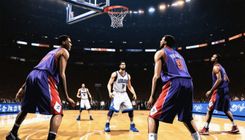Exploring Potential NBA Trades That Could Change Team Dynamics

NBA trade season is more than just a fleeting period; it extends throughout the entire year, entangling nearly every player in a myriad of speculative trades. The primary objective is to shift focus away from the deals most frequently discussed, particularly those involving high-profile players. This analysis centers on noteworthy athletes who may not be making headlines but could realistically switch teams in the near future. By considering unexpected destinations for these players, the conversation expands beyond the usual narratives.
One potential trade scenario involves the Chicago Bulls acquiring Jonathan Kuminga from the Golden State Warriors via a sign-and-trade arrangement involving Coby White. With Kuminga considered a restricted free agent, reports indicate that he and the Warriors are inclined to explore sign-and-trade options. Kuminga, a dynamic forward, has demonstrated his ability to draw fouls and make significant contributions, averaging 12.5 points, 4.6 rebounds, and 2.2 assists while shooting 50.7 percent during his tenure with Golden State. However, he struggled to adapt to the Warriors' tempo, often finding himself out of the rotation. If the Bulls decide to pursue Kuminga, the Warriors may seek White in return, as his expiring $12.8 million contract for the 2025-26 season aligns well with addressing Golden State’s pressing needs for scoring and play creation.
Another intriguing trade speculation features the Dallas Mavericks acquiring Jrue Holiday from the Boston Celtics, sending a package that includes PJ Washington, Daniel Gafford, Olivier Maxence-Prosper, and a future first-round pick. The Celtics' future is uncertain, especially as they navigate the 2025-26 season likely without Jayson Tatum, recovering from a serious injury. By parting with Holiday, the Celtics could mitigate payroll while bringing in two promising talents in Washington and Gafford, who could help soften the blow of losing free agent Al Horford. This trade would not only keep Boston competitive but also pave the way for cost-saving measures moving forward. Meanwhile, Dallas would secure a veteran point guard to bridge the gap created by Kyrie Irving's absence, aligning with the team’s goals of enhancing defensive capabilities and immediate competitive stance.
In another trade scenario, the Orlando Magic could target Jaylen Brown from the Boston Celtics, offering Jonathan Isaac, Anthony Black, Moritz Wagner, and two protected future first-round picks. Given Boston’s complicated financial situation, this trade represents an opportunity for the Magic to acquire a star with championship experience. Brown’s presence, alongside emerging talents like Jalen Suggs and Paolo Banchero, could significantly elevate Orlando's offensive capabilities. This trade is positioned as a strategic move for the Celtics to gain flexibility while allowing them to offload salary, as younger prospects and draft picks come into play.
The Cleveland Cavaliers might consider trading for Cam Johnson from the Brooklyn Nets, providing a package that includes Jarrett Allen, Jaylon Tyson, and a protected future first-round pick. Following a disappointing postseason, the Cavaliers could be looking to reconfigure their roster around Evan Mobley, particularly by moving on from Allen to bring in Johnson, who represents a valuable frontcourt shooter. While both players show similar talent, Johnson’s shooting ability could enhance the Cavaliers' offensive sets. This trade could benefit both teams, with Brooklyn gaining a capable center while the Cavaliers secure a versatile forward to strengthen their lineup.
Lastly, a trade proposal could surface involving the Milwaukee Bucks acquiring Bradley Beal from the Phoenix Suns in exchange for Damian Lillard. Given that Lillard’s current situation makes a direct swap complicated, a third team may need to facilitate this trade. Although Lillard is facing a significant injury setback, Beal may emerge as a more valuable asset for the Bucks in the upcoming season. Both teams could derive benefits from such a transaction, even as they navigate challenges related to players' injuries and contract complexities.









